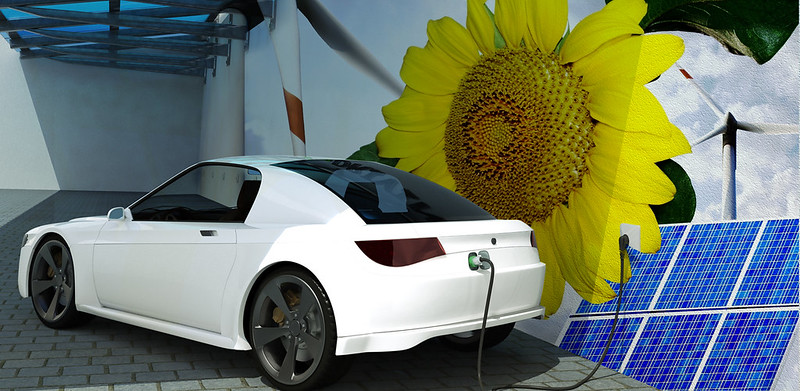This story is a part of Covering Climate Now’s week of coverage focused on Climate Solutions, to mark the 50th anniversary of Earth Day. Covering Climate Now is a global journalism collaboration committed to strengthening coverage of the climate story.
Petroleum products continue to fuel most of our vehicles while fouling our air, leaving some people more vulnerable to suffering severe impacts from respiratory illnesses like COVID-19. Transportation is also the largest source of greenhouse gas emissions in the U.S., and studies show that powering our cars, trucks, and buses with electricity would reduce climate pollution.
With the oil industry suffering what is probably its worst year in history, and the window of time for tackling the climate crisis narrowing, could this be the best and last chance the world has to push the accelerator on electrifying transportation?
 The Decade of the Electric Vehicle
The Decade of the Electric Vehicle
The market for electric vehicles (EV) has grown rapidly over the last 10 years as battery costs have declined and new vehicle models and public charging stations have emerged. The average cost of the lithium-ion battery (per kilowatt-hour) has fallen 85 percent since 2010 and further reductions in battery costs are expected.
According to the International Energy Agency, the number of charging stations worldwide in 2018 was estimated at 5.2 million, an increase of 44 percent over the previous year. The U.S. had 1.1 million electric vehicles on the road at the end of 2018 and globally there were over 5 million. By the end of 2019, there were nearly 1.5 million electric vehicles on U.S. roads.
EV market analysts project this growth to continue, with the 2020s considered to be the “decade of the electric vehicle.” According to BloombergNEF’s 2019 Electric Vehicle Outlook, global passenger EV sales are expected to climb to 10 million in 2025 and 28 million by 2030. EVs are also expected to reach cost parity and become cheaper than gas-powered cars by the mid-to-late 2020s.
“Our conclusions are stark for fossil fuel use in road transport. Electrification will still take time because the global fleet changes over slowly but, once it gets rolling in the 2020s, it starts to spread to many other areas of road transport,” said Colin McKerracher, head of advanced transport for BloombergNEF.
Our Electric Vehicle Outlook 2019 is out now!
We expect passenger EV sales to rise from 2 million worldwide in 2018 to 28 million in 2030 and 56 million by 2040. Find key trends and highlights from the Outlook here. https://t.co/bd6Oc2s0f2 #EVRevolution
— BloombergNEF (@BloombergNEF) May 15, 2019
Some recent headlines suggest a gloomy outlook for EVs in the context of the coronavirus pandemic, based off a Wood Mackenzie analysis projecting a 43 percent drop in global EV sales this year. But that same analysis also included this statement: “As challenging as it is, the coronavirus is an anomalous event. It may stall the electrification of the transport industry, but the direction of travel remains unchanged — the fight against climate change is still very much on.”
In other words, the economic downturn will likely see a dampening of the EV market in the short term but the electrification trend will continue.
“There will be near-term impacts on volumes in 2020–2023 that will reduce the ability of automakers to spread capital investments, but if China and EU markets recover and regulations remain largely unchanged for 2025 in those markets we should see a ramp-up in volumes, continued progress in reducing battery prices, and other improvements in material cost with the next-generation EV platforms set to launch in the early 2020’s,” McKinsey & Company’s Patrick Hertzke explained.
If one thing is clear, it is that the automotive industry appears steered towards an all-electric future regardless of any immediate impact from the pandemic.
“Our EV portfolio including the GMC Hummer EV, Cadillac Lyriq, Cruise Origin and our Ultium battery program will see little or no impact,” a General Motors spokesperson said via email. “We’re not wavering on our vision of an all-electric future.”
Levers of Support
The electrification of vehicles appears inevitable, and indeed is already underway. Government policies can help support and quicken this transition. Experts say this policy support is critical in order to meet climate targets and to help ensure the auto industry stays profitable and competitive as society decarbonizes.
“Governments have strong incentives to reduce CO2 levels, improve air quality in cities, and drive job growth,” Hertzke said. “To avoid a hard landing for the auto industry and its workers from a profitability perspective, there are many things governments can do to ease the transition to more sustainable transport. Even in response to the COVID-19 crisis there are levers to pull including vehicle scrappage programs that promote faster turnover of older vehicles with a switch to BEV [batter electric] and PHEV [plug-in hybrid electric] vehicles, ‘green stimulus’ programs that direct government funds toward charging infrastructure build out, and extension of consumer subsidies for EV purchases.”
Read more of DeSmog’s Covering Climate Now stories on Climate Solutions
Cash incentives, support to expand charging infrastructure, and vehicle turnover programs could be integrated into economic stimulus packages or the longer-term recovery process from the pandemic.
“Part of the economic recovery can be to create incentives within the economic stimulus to support electrification,” said Ben Prochazka, national director of the Electrification Coalition, which advocates for electrifying transportation and reducing dependence on oil. “The opportunity to reduce transportation emissions is something we should be prioritizing.”
The EV federal tax credit, Prochazka said, is a “critically important tool.” The credit for consumers who buy or lease an EV in the U.S. is up to $7,500, though it phases out when auto manufacturers sell over 200,000 qualifying electric vehicles. Tesla and General Motors have both reached this cap.
Senior Airman Alec Cope plugs in a hybrid vehicle at Hanscom Air Force Base, Massachusetts, June 2, 2016. Credit: U.S. Air Force photo/Linda LaBonte Britt, public domain
Some lawmakers have proposed bills to extend the tax credit and raise the cap, but President Trump and conservative think tanks with ties to Koch funding have opposed these proposals. General Motors has supported extending the federal tax credit, and a company spokesperson said when the “time is appropriate” GM will continue to advocate for it. “The EV tax credit provides a proven pathway to establish the U.S. as a leader in electrification, helping make electric vehicles more accessible for all customers,” the spokesperson said.
Creating the charging infrastructure necessary for electric vehicles is essential to advancing the electrification transition. At the federal level, a bipartisan transportation bill introduced last year included up to $1 billion to fund EV charging infrastructure. Another bill introduced in February by Democratic Representatives Alexandria Ocasio-Cortez and Andy Levin calls for developing a national network of electric vehicle charging stations within five years.
“Establishing a nation-wide network of electric vehicles charging stations helps us reduce emissions, creates good paying jobs, and will help transition the U.S. economy to a cleaner future,” Ocasio-Cortez said in a press release announcing the EV Freedom Act.
Credit: @AOC
States, municipalities, and electric utilities are undertaking investments and initiatives to expand EV charging. According to a National Governors Association white paper, 35 states are using their Volkswagen Settlement funds’ maximum allocation (15 percent) for EV charging projects. Cities are starting to pass EV Ready ordinances, which require a percentage of residential and commercial spaces to support EV charging. And electric utilities can play a role by investing in the charging infrastructure.
Another policy proposal that would help boost EV charging, stimulate clean car manufacturing, and incentivize consumer EV purchasing is Senate Democratic Leader Chuck Schumer’s (D-NY) Clean Cars for America initiative introduced last fall. The proposal borrows from the previous Cash for Clunkers stimulus measure, providing Americans with a cash voucher to trade in an old gasoline-powered car for a qualifying electric or plug-in hybrid vehicle. It also would establish a grant program for states and localities to expand charging infrastructure as well as offer “robust incentives” for manufacturers to build or renovate factories to produce the clean vehicles.
According to a press release on the proposal, the plan would “result in 63 million fewer carbon-emitting cars” and create an estimated tens of thousands of good-paying U.S. jobs.
‘Policymakers Need to Make a Choice’
The incumbent fossil fuel industry presents perhaps the most substantial roadblock to making road transportation cleaner. Although there is currently an opportunity to include electric vehicle policies and other green measures in economic recovery efforts, the political allies of oil and gas interests seem unlikely to embrace these measures.
The Trump administration has used this time of crisis to dole out favors to the faltering oil companies, such as granting a request from the American Petroleum Institute to temporarily ease environmental reporting and compliance requirements, and is examining the possibilities of opening up funds or facilitating access to lending programs under coronavirus economic relief efforts.
President Trump even convened an in-person meeting with oil executives earlier this month. That meeting occurred just days after his administration released a final rule weakening clean car standards, a rollback that solely benefits the petroleum industry.
Image by Gerd Altmann from Pixabay
“The fossil fuel industry is trying to stop a transition to cleaner transportation at every turn, from the Koch-funded effort to halt or eliminate the EV tax credit to pushing the Trump administration to roll back fuel economy and emissions standards,” said Don Anair, research and deputy director for the Clean Vehicles Program at the Union of Concerned Scientists. “Policymakers need to make a choice, invest in the fossil fuel industries of the 20th century, or invest in the technologies and industries that will position the U.S. for growth in the global economy of the 21st century?”
Ultimately, EV advocates suggest, it is a choice between lining the pockets of oil executives, or promoting American economic leadership while protecting national security, public health, and the climate.
“Electrification of our transportation sector improves our economic security,” the Electrification Coalition’s Ben Prochazka added. “It reduces our dependence on oil, which has huge geopolitical influences. An EV is the only vehicle on the road that will get cleaner over time as our electricity sector gets cleaner … At the end of the day, EVs offer a lot more solutions than a gas car ever can.”
Main image: Plug-in Hybrid Car at Argonne National Laboratory. Credit: U.S. Department of Energy, U.S. Government Work
Subscribe to our newsletter
Stay up to date with DeSmog news and alerts



 The Decade of the Electric Vehicle
The Decade of the Electric Vehicle






